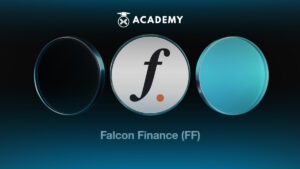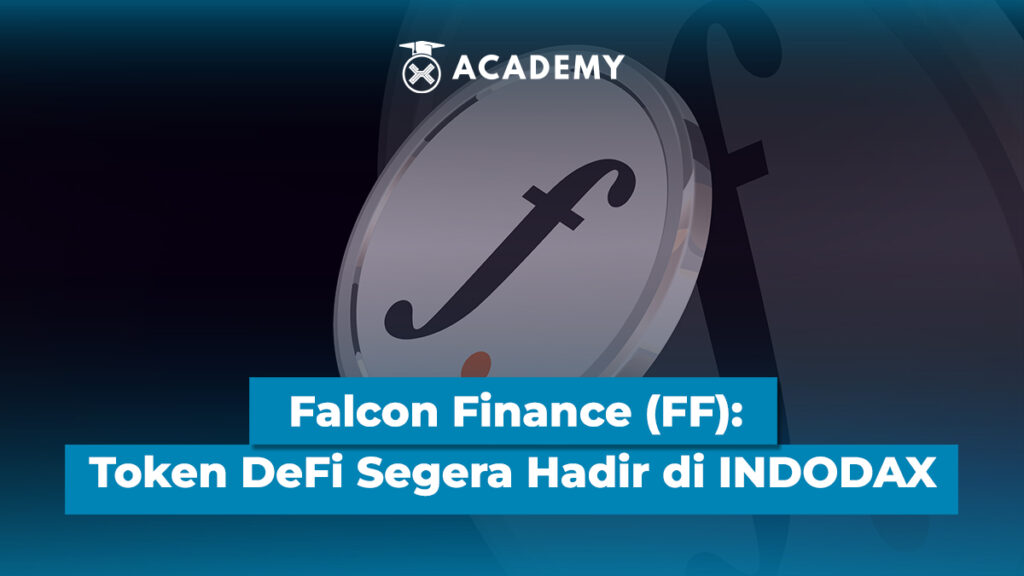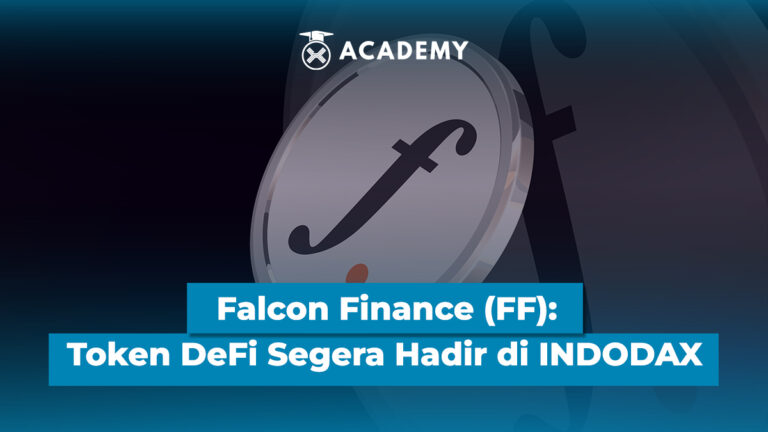Recently, the world of Decentralized Finance (DeFi) has become increasingly popular with the emergence of various new projects bringing innovation to the decentralized financial system.
One that has caught our attention is Falcon Finance (FF), a collateral-based DeFi protocol that is rumored to soon be listed on Indodax, one of the largest crypto exchanges in Indonesia.
This article is not intended to encourage you to invest, but rather to provide an educational understanding of the concept behind Falcon Finance and how the project is trying to build trust in the DeFi ecosystem.
So, what exactly is Falcon Finance and how does it work?
What is Falcon Finance (FF)?

Falcon Finance adalah protokol DeFi yang memungkinkan berbagai aset likuid digunakan sebagai jaminan untuk mencetak stablecoin.
Proyek ini berdiri di atas konsep “Universal Collateralization Infrastructure”, yakni sistem yang memungkinkan aset kripto dari berbagai jenis dapat dimanfaatkan sebagai collateral untuk menciptakan likuiditas baru dalam bentuk stablecoin.
Falcon Finance memiliki tiga komponen utama dalam ekosistemnya. Pertama, FF token berperan sebagai token utilitas dan instrumen tata kelola.
Pemiliknya dapat berpartisipasi dalam pengambilan keputusan serta mengakses berbagai fitur khusus di dalam protokol.
Kedua, USDf, yaitu stablecoin sintetis yang nilainya dipatok 1:1 terhadap Dolar AS dan berfungsi sebagai alat transaksi serta penyimpan nilai.
Ketiga, sUSDf, versi yield-bearing dari USDf yang memungkinkan pemiliknya memperoleh imbal hasil dari aset yang dijaminkan.
Melalui mekanisme ini, Falcon Finance berupaya memperluas likuiditas di dunia DeFi dengan menghadirkan sistem yang efisien, transparan, dan dapat diakses oleh berbagai jenis pengguna aset digital.
How Falcon Finance Works
Falcon Finance operates through three main stages. First, users deposit crypto assets such as BTC, ETH, or stablecoins as collateral within the protocol.
Second, the system then mints USDf, a stablecoin equivalent in value to the US Dollar, based on the amount of collateral deposited.
Third, users can stake USDf to earn sUSDf, a yield-bearing version that provides a return on the collateralized assets.
To maintain system stability and security, Falcon Finance implements the principle of over-collateralization, meaning each minted stablecoin must be backed by collateral greater than the loan amount issued.
This model is similar to the mechanism used by MakerDAO (DAI), but Falcon Finance claims to have a broader reach because it supports a variety of asset types, including Real World Assets (RWA), as part of its ecosystem.
Function and Role of the FF Token
Within the Falcon Finance ecosystem, the FF token serves as a governance instrument, giving its holders the right to participate in determining the direction and parameters of the system, including risk policies and collateral asset management.
Furthermore, FF can also be used for staking, allowing users to earn additional incentives while lowering protocol fees when interacting within the ecosystem.
This token’s role is not designed to provide profit claims, but rather to strengthen community participation, maintain system balance, and encourage the sustainable growth of the DeFi ecosystem.
Now that we know how it works and its functions, what makes Falcon Finance interesting to watch?
Falcon Finance’s Technological Strengths
Falcon Finance stands out thanks to its flexible and adaptable technological approach to the modern DeFi ecosystem.
One of its strengths lies in its collateral flexibility, where the protocol can accept various types of crypto assets, even tokenized real-world assets (RWA), as collateral.
Therefore, Falcon Finance opens up opportunities for more assets to contribute to the decentralized financial system.
Furthermore, Falcon Finance provides on-chain liquidity, allowing users to utilize previously idle assets.
Through this mechanism, stored assets can remain productive without having to be sold, creating efficiency in capital management.
Another advantage lies in its integrated yield model, where sUSDf staking offers the potential for returns derived from the protocol’s own activity, not just traditional farming yields.
Coupled with its multi-chain architecture, Falcon Finance has the potential to support cross-network interoperability, expanding its reach and utility across various blockchain ecosystems.
All of these advantages emphasize Falcon Finance’s technological strength, not just as a promise of profits, but as an innovative foundation for building a more efficient and sustainable DeFi system.
Falcon Finance Risks and Challenges
Behind its innovation, Falcon Finance still carries a number of risks that need to be understood before engaging within its ecosystem.
One of the main risks is collateral volatility risk, where the value of collateral assets such as Bitcoin (BTC) or Ethereum (ETH) can drop drastically due to market fluctuations. This condition has the potential to trigger liquidations or reduce system stability.
Furthermore, there is the risk of USDf stablecoin depeg, which is the possibility that the value of USDf will no longer be balanced against the US dollar if the collateralization mechanism or asset management is disrupted.
Another challenge comes from smart contract and DeFi security risks, as every decentralized protocol relies on code that can contain vulnerabilities or be exploited by malicious parties.
Falcon Finance also faces regulatory risks, particularly due to its involvement with real-world assets (RWAs), which remain a gray area in many jurisdictions.
Understanding these risks is crucial to wisely assessing a project’s potential and limitations. The world of DeFi offers many opportunities, but it also requires a thorough understanding before taking any action.
Falcon Finance (FF) Token Soon to List on Indodax
Falcon Finance (FF) is scheduled to soon be available on the Indodax crypto exchange as a new crypto asset, expanding the options available to users in Indonesia.
This launch is an exciting opportunity to learn more about the concept of collateralized DeFi.
This system allows digital assets to be used as collateral to mint stablecoins and open up new liquidity opportunities in the blockchain ecosystem.
However, it’s important to remember that this information is not an investment solicitation, but rather part of an educational effort to help users understand the characteristics and mechanisms of the assets that will be available on Indodax.
Ultimately, Falcon Finance is a clear example of how DeFi protocols strive to strengthen the decentralized finance ecosystem through an asset-backed stablecoin model.
Conclusion
So, that was an interesting discussion about Falcon Finance (FF), the DeFi Collateral token soon to be listed on Indodax. You can read more about it in the INDODAX Academy.
In conclusion, Falcon Finance (FF) is an innovation in the collateralized DeFi space, offering the USDf stablecoin and an integrated yield system that enables digital assets to perform more productively.
The emergence of new tokens like FF is proof that the DeFi world continues to evolve, presenting new ways to open up access to liquidity for users in the crypto ecosystem.
It’s always important to understand the functions and risks of crypto assets before trading to ensure informed and informed decisions.
In addition to gaining in-depth insights through popular crypto education articles, you can also broaden your horizons through a collection of tutorials and choose from a variety of popular articles that align with your interests.
Besides updating your knowledge, you can also directly monitor digital asset prices on Indodax Market and stay up-to-date with the latest crypto news. For a more personalized trading experience, explore Indodax’s OTC trading service. Don’t forget to activate notifications so you don’t miss out on important information about blockchain, crypto assets, and other trading opportunities.
You can also follow our latest news via Google News for faster and more reliable access to information. For an easy and secure trading experience, download the best crypto app from INDODAX on the App Store or Google Play Store.
Maximize your crypto assets with the INDODAX crypto staking feature, a practical way to earn passive income from your stored assets. Register now at INDODAX and easily complete KYC to start trading crypto more safely, conveniently, and reliably!
Indodax Official Contact
Customer Service Number: (021) 5065 8888 | Support Email: [email protected]
Also follow us on social media here: Instagram, X, YouTube & Telegram
FAQ
1.What is Falcon Finance (FF)?
Falcon Finance (FF) is a collateral-based DeFi protocol that allows users to use liquid assets like BTC, ETH, or stablecoins as collateral to mint a synthetic stablecoin called USDf.
This project promotes the concept of Universal Collateralization Infrastructure, a system that unlocks liquidity across various asset types on the blockchain.
2.What is the function of the FF token in the Falcon Finance ecosystem?
The FF token serves as a governance token in the Falcon Finance ecosystem. FF token holders can participate in decision-making, such as determining the collateral ratio or assets that can be used in the protocol.
Furthermore, this token can also be used for staking and earn incentives from ecosystem activities.
3.What are USDf and sUSDf in Falcon Finance?
USDf is a synthetic stablecoin pegged to 1 USD and minted based on collateral assets.
sUSDf is a yield-bearing version of USDf, a token that provides returns based on the protocol’s strategies.
Simply put, USDf represents on-chain liquidity, while sUSDf provides access to the yield from managed DeFi activities.
4.How does the collateral system work in Falcon Finance?
Falcon Finance operates with an over-collateralization mechanism, meaning users must deposit assets with a value higher than the amount of stablecoins they wish to mint.
The goal is to maintain system stability even if the price of the collateral asset falls. If the collateral value falls below a threshold, the assets can be automatically liquidated to maintain the stability of USDf.
5.What are the main advantages of Falcon Finance over other DeFi protocols?
Falcon Finance offers collateral flexibility, as it supports a wide range of assets, including real-world asset tokenization (RWA).
Furthermore, its yield model uses an integrated approach—not just farming, but also market-neutral strategies for more stable yields.
6.What are the main risks of a project like Falcon Finance?
The main risks include:
- Volatility of the collateral asset, which can lead to liquidation.
- Depeg stablecoins, if the collateral system fails to balance the value of USDf.
- Smart contract risks, such as bugs or exploits.
- Regulatory changes, especially due to the involvement of real-world assets.
7.Is Falcon Finance (FF) listed on Indodax?
Falcon Finance (FF) is scheduled to be listed on the Indodax platform soon as a new crypto asset.
Author: Boy





 Polkadot 10.19%
Polkadot 10.19%
 BNB 1.03%
BNB 1.03%
 Solana 4.87%
Solana 4.87%
 Ethereum 2.37%
Ethereum 2.37%
 Cardano 1.68%
Cardano 1.68%
 Polygon Ecosystem Token 2.03%
Polygon Ecosystem Token 2.03%
 Tron 2.89%
Tron 2.89%
 Market
Market


